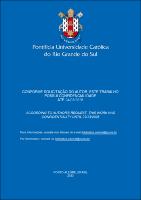| Share record |


|
Please use this identifier to cite or link to this item:
https://tede2.pucrs.br/tede2/handle/tede/10670| Document type: | Dissertação |
| Title: | Do desamparo à ilusão : a origem psicanalíticade Deus na metapsicologia freudiana |
| Author: | Bitencourt, Lucas Bandeira  |
| Advisor: | Souza, Draiton Gonzaga de |
| Abstract (native): | O objetivo deste estudo consiste em fundamentar a argumentação de Freud que sustenta a ideia de que, sendo a religião uma neurose, a ideia de Deus – a ser superada – é uma ilusão criada pelos seres humanos na busca de aplacar seu sentimento de desamparo. A questão de pesquisa levantada é respondida ao longo dos três capítulos desta dissertação, ao tratar sobre (1) o conceito de desamparo, (2) a origem da ideia de Deus e, (3) a proposta de Freud acerca da religião como uma neurose a ser superada por meio de uma educação à realidade. Ao estender a sua teoria psicanalítica para além da análise pessoal, Freud coloca as questões culturais sob o crivo da interpretação de sua ciência. Então, encontra a gênese histórica da religião e da crença em deus no mito da horda primitiva, previamente apresentado pelo evolucionismo de C. Darwin, na hipótese totêmica e nos tabus fundantes das civilizações, à teorização do Complexo de Édipo e ao sentimento de culpa herdado pela cultura. Por fim, o autor analisa o fenômeno religioso do ponto de vista da neurose e propõe um mundo sem deus, considerando as dificuldades éticas envolvidos nessa escolha e avalia que será muito benéfico à humanidade substituir a crença na religião pela crença na ciência. |
| Abstract (english): | The aim of this study is to substantiate Freud's argument that supports the idea that, since religion is a neurosis, the idea of God – to be overcome – is an illusion created by human beings in their quest to assuage their feeling of helplessness. The research question raised is answered throughout the three chapters of this dissertation, dealing with (1) the concept of helplessness, (2) the origin of the idea of God and, (3) Freud's proposal about religion as a neurosis to be overcome through an education to reality. By extending his psychoanalytic theory beyond personal analysis, Freud places cultural issues under the sieve of the interpretation of his science. Then, it finds the historical genesis of religion and belief in god in the myth of the primitive horde, previously presented by C. Darwin's evolutionism, in the totemic hypothesis and in the founding taboos of civilizations, in the theorization of the Oedipus Complex and in the inherited sense of guilt by culture. Finally, the author analyzes the religious phenomenon from the point of view of neurosis and proposes a world without God, considering the ethical difficulties involved in this choice and evaluates that it will be very beneficial to humanity to replace belief in religion with belief in science. |
| Keywords: | Psicanálise Desamparo Ilusão Filosofia da religião Deus |
| CNPQ Knowledge Areas: | CIENCIAS HUMANAS::FILOSOFIA |
| Language: | por |
| Country: | Brasil |
| Publisher: | Pontifícia Universidade Católica do Rio Grande do Sul |
| Institution Acronym: | PUCRS |
| Department: | Escola de Humanidades |
| Program: | Programa de Pós-Graduação em Filosofia |
| Access type: | Acesso Aberto |
| Fulltext access restriction: | Trabalho será publicado como artigo ou livro |
| Time to release fulltext: | 60 meses |
| Date to release fulltext: | 24/03/2028 |
| URI: | https://tede2.pucrs.br/tede2/handle/tede/10670 |
| Issue Date: | 15-Dec-2022 |
| Appears in Collections: | Programa de Pós-Graduação em Filosofia |
Files in This Item:
| File | Description | Size | Format | |
|---|---|---|---|---|
| DIS_LUCAS_BANDEIRA_BITENCOURT_CONFIDENCIAL.pdf | LUCAS_BANDEIRA_BITENCOURT_DIS | 627.42 kB | Adobe PDF |  Download/Open Preview |
Items in DSpace are protected by copyright, with all rights reserved, unless otherwise indicated.




